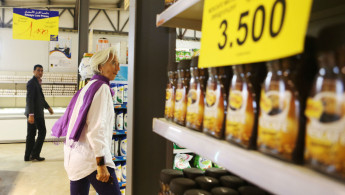Jordan's national debt soars to dangerous levels
Jordan's national debt has soared to dangerous levels due to the combined effects of war, an economic slump and the rising costs of power generation, according to the chairman of the parliament's economic committee.
In an exclusive interview, Kheir Abu Seileik said the national debt now exceeded what was considered "acceptable" limits.
The IMF's latest report on Jordan said public debt stood at 91.1 percent of GDP in 2014. Kheir Abu Seileik said he expected it would reach 92.6 percent this year.
Jordan's finance ministry said public debt stood at $29.19bn in November 2014, compared to $26.92bn in 2013.
Abu Seilik said the increase was affected by the high cost of energy and a slowdown in investment due to regional disturbances.
He noted that Jordan bore huge losses because of disruptions in the supply of gas from Egypt since 2011. The state-owned National Electricity Company has started using heavy fuel oil, which has increased the cost of power generation threefold.
According to the finance ministry, the net public debt includes the value of borrowings meant to cover the accumulating monetary deficit of the National Electricity Company. The company's deficit was $6.48bn in November 2014.
| Jordan's finance ministry said public debt stood at $29.19bn in November 2014, compared to $26.92bn in 2013. |
Abu Seilik called on Arabian Gulf states to renew their aid programmes for Jordan, which have pledged $5bn to Jordan over several years, and said solutions were needed to tackle the energy crisis.
Ezzedin Kanakriyeh, the undersecretary of the finance ministry, told al-Araby that Jordan seeking to upgrade the tax collection efficiency to increase revenues.
Jordan is due to receive the latest tranche of a $2bn IMF loan, which will push public debt higher.
Tourism slump as Jordan faces economic crisis
Meanwhile Yousef Baker, the head of the state tourism committee, has said tourism income in the first two months of the year was 40 percent down on the same period last year. He told al-Araby that Petra was particularly affected.
Baker called on the government to give incentives to Arab and foreign tourists, such as reducing the rates of flights run by local airlines.
Baker said Jordanian tourism companies were planning to sign agreements with Turkey to boost religious tourism to Jordan. Turkey has issued a decision banning travel to Jerusalem via Israel buty allowing travel to the city via Jordan.
Petra has been hardest hit. Fawaz al-Hasanat, the head of the hotel association in Petra, said several hotels faced closure and 1,800 people had recently been made redundant.
Official figures show that the number of tourists who stay in Jordan rose by 1.1 percent last year to a total of 3.98 million, compared with 2013.
This is an edited translation of the original Arabic.





 Follow the Middle East's top stories in English at The New Arab on Google News
Follow the Middle East's top stories in English at The New Arab on Google News


